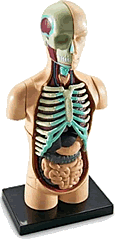Causes of Diarrhea
Diarrhea (common American English spelling) is also spelt diarrhoea (British English spelling).
What is Diarrhea ?
Diarrhea or 'diarrhoea' is an increase in the volume and fluidity of faeces (also spelt feces).
Diarrhea is unpleasant and often inconvenient, distressing and embarrassing. Severe or prolonged diarrhea can have serious medical implications due to excessive loss of fluid, salts and nutrients from the body.
There are several types of diarrhea and many possible causes of diarrhea.
Causes of diarrhea can be classified in various ways, e.g. as due to
- Infections or the consequences of having had an infection
incl. viral, bacterial, parasitic
- Something ingested (swallowed)
e.g. certain drugs - esp. in inappropriate doses, or toxins (poisons) in food
- Some metabolic conditions
e.g. due to imbalances in the endocrine system
- Some long-term (i.e. chronic) illnesses
especially those affecting the digestive system
The following table lists some specific causes of diarrhea for each of these categories of causes of diarrhea.
General Type
of Cause of Diarrhea |
Sub-classification of cause |
Examples of specific cause / agents
(listed in alphabetical order) |
|
1. Infections & Pathogens |
|
Viruses |
- Enteric adenovirus
- Norwalk agent
- Rotavirus
|
|
Bacterial Toxins (Bacteria) |
- Bacillus cereus
- Clostridium botulinum
- Clostridium difficile
- Clostridium perfringens
- Escherichia coli (Toxigenic Escherichia coli)
- Staphylococcus
- Vibrio cholerae
|
|
Bacterial invasions (Bacteria) |
- Campylobacter fetus
- Campylobacter jejuni
- E. coli (Invasive E. coli)
- Gonorrhea (= Gonorrhoea = Gonorrhoeae)
- Salmonella
- Shigella
- Vibrio parahaemolyticus
- Yersinia enterocolitica
|
|
Parasites |
- Cryptosporidium
- Giardia lamblia
- Entamoeba histolytica
|
|
After-effects of infections
(in general) |
- Bacterial overgrowth
(  bacterial imbalance) bacterial imbalance)
- Other imbalances or deficiencies in the digestive system, e.g. insufficient lactase
|
|
2. Ingested Substances |
|
Drugs / Pharmaceuticals
in the wrong circumstances or doses |
- Antacids with magnesium
- Laxatives (obviously)
|
|
Toxins in Food |
- Ciguatoxin
- Pufferfish
- Scombroid
|
|
Bacterial Toxins (Bacteria)
- as above |
See the Bacterial Toxins listed above.
Some of those might also be ingested with food
e.g. due to poor kitchen hygiene. |
3. Metabolic Conditions |
|
certain diseases & disorders of the endocrine system |
- Adrenal insufficiency
- Diabetes Mellitus
- Hyperparathyroidism
- Hyperthyroidism
|
4. (Other) Chronic Medical Conditions |
|
e.g. certain diseases & disorders of the digestive system |
|
|

|

|

|
|
|
Note: The above lists of viruses, bacteria and parasites that may cause diarrhea are examples, not complete lists. In some cases, there are "safe" levels of bacteria, the risk of diarrhea being if or when the bacteria are either in a part of the body that cannot tolerate them and / or if / when they are present in excessive quantities.
See also common diseases and disorders of the digestive system (summarized on a single page), and links to individual pages about even more (40+) conditions / disorders affecting the digestive system.










